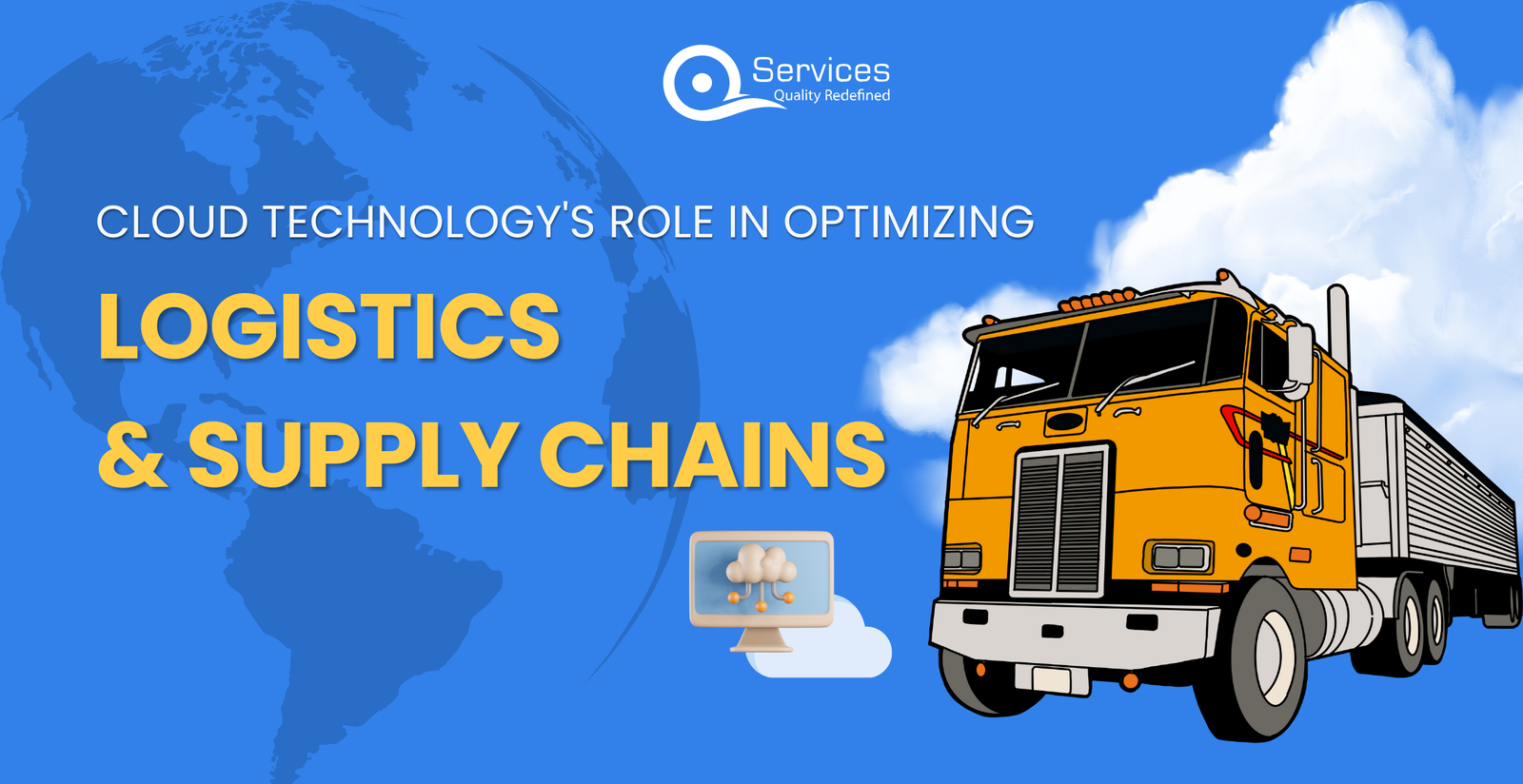Rewards
.





CANADA
55 Village Center Place, Suite 307 Bldg 4287,
Mississauga ON L4Z 1V9, Canada
Certified Members:
.



Home » The Role of Cloud Technology in Logistics and Supply Chain Optimization

The fast-paced, increasingly digital world of today presents several difficulties in Logistics and Supply Chain Optimization. Businesses are always seeking for innovative ways to boost their sales, whether it is through supply chain management, real-time tracking, or other means. A game-changer that could fundamentally alter the way logistics organisations operate and compete in the market is cloud computing.
Before delving into the manifold benefits, it brings to the table, it is crucial to understand what exactly digital transformation in logistics entails. At its core, cloud technology refers to the delivery of computing services, including servers, storage, databases, and software, over the internet. Rather than relying on local infrastructure, businesses can leverage the cloud to access resources on-demand, enabling greater scalability and flexibility.
Cloud technology, also referred to as cloud computing, involves the utilization of a network of remote servers on the internet to store, manage, and process data, as opposed to relying on a local server or personal computer. Within the expansive realm of cloud computing, a standout contributor is Microsoft Azure—a robust platform offering a comprehensive suite of services designed for businesses to construct, deploy, and manage applications across its extensive global network of data centers.
Aligned with the fundamental principles of cloud technology, Microsoft Azure empowers businesses to access and manipulate resources as needed, eliminating the necessity for burdensome infrastructure investments. Operating on a pay-as-you-go model, cloud technology, with services like Microsoft Azure, presents a cost-effective approach, making it an enticing choice for organizations seeking to optimize their IT infrastructure. Moreover, cloud technology, especially when harnessed through platforms like Microsoft Azure, guarantees high availability and reliability, with service providers ensuring continual accessibility to resources and regular data backups.
Regarding scalability, businesses can effortlessly adjust the scale of their resources in response to demand fluctuations, allowing for swift adaptation to dynamic market conditions. This adaptability is particularly advantageous for startups and small businesses utilizing the capabilities offered by Microsoft Azure. Notably, Microsoft Azure extends its influence into the realm of application development, fostering a thriving ecosystem of Azure-developed apps. This enriches the platform’s offerings by providing businesses with a robust environment for creating and managing applications seamlessly within the Azure framework.
Get free Consultation and let us know your project idea to turn into an amazing digital product.
While not explicitly mentioned, the seamless integration capabilities of Microsoft Dynamics 365 are inherent in the discussion. The comprehensive suite of services provided by Azure includes offerings that align with Microsoft Dynamics 365, creating a cohesive ecosystem for businesses to construct, deploy, and manage applications. This integration ensures a holistic approach to cloud technology adoption.
The evolution of cloud technology has been remarkable. What once started as a luxury for large enterprises has now become a critical tool for businesses of all sizes. According to a report by Gartner, the public cloud services market is projected to reach $331.2 billion in 2022, with a staggering compound annual growth rate of 23.1%. This surge in adoption can be attributed to the numerous advantages cloud technology offers to the logistics industry.
In the logistics industry, cloud technology has revolutionized operations by providing real-time visibility and collaboration across the supply chain. With cloud-based inventory management solutions, companies can track shipments, manage inventory, and optimize routes more efficiently.
Furthermore, cloud technology has enabled the integration of emerging technologies such as artificial intelligence (AI) and Internet of Things (IoT) into logistics processes. AI-powered algorithms can analyze vast amounts of data to identify patterns and make accurate predictions, helping businesses optimize their supply chain and reduce costs. IoT devices, such as sensors and RFID tags, can provide real-time data on the condition and location of goods, enabling proactive monitoring and minimizing the risk of disruptions.
As cloud technology continues to evolve, we can expect further advancements in areas such as edge computing, hybrid cloud solutions, and enhanced security measures. Edge computing brings computing resources closer to the data source, reducing latency and enabling real-time processing. Hybrid cloud solutions combine public and private cloud environments, offering greater flexibility and control over data. Enhanced security measures, including encryption and multi-factor authentication, ensure the protection of sensitive information stored in the cloud.
In conclusion, cloud technology has transformed the way businesses operate by providing scalable, cost-effective, and flexible computing resources. Its evolution has paved the way for innovative solutions in various industries, including logistics. As organizations continue to embrace cloud technology, we can expect further advancements that will drive efficiency, productivity, and competitiveness in the digital era.
Successful logistics companies are built on effective supply chain management. Real-time visibility and cooperation made possible by cloud technology allow businesses to optimise their supply chain operations while keeping a close check on Supply Chain Data Analytics and Cloud Computing Case Studies. Businesses may make data-driven decisions with immediate access to vital information like inventory levels, order status, and supplier performance, increasing efficiency and reducing delays.
Cloud-based supply chain management systems also offer advanced analytics capabilities. By leveraging big data and machine learning algorithms, logistics companies can gain valuable insights into their operations. These insights can help identify areas for improvement, such as optimizing transportation routes, reducing inventory holding costs, and predicting demand patterns. With the ability to analyze vast amounts of data in real-time, businesses can proactively address supply chain challenges and stay ahead of the competition.
In an era where customers demand transparency and timely updates, cloud technology enables logistics companies to offer real-time tracking capabilities. By integrating GPS technology and cloud-based logistics software, businesses can provide accurate shipment information, allowing customers to track their deliveries from pick-up to the destination. This not only enhances customer satisfaction but also streamlines internal operations and reduces the risk of lost or delayed shipments.
Cloud-based tracking systems can also improve supply chain visibility beyond the final delivery. By capturing data at every stage of the logistics process, companies can monitor the movement of goods, identify potential bottlenecks, and proactively address any issues that may arise. This level of visibility enables logistics providers to offer value-added services such as proactive notifications, exception management, and real-time alerts, ensuring a seamless and efficient supply chain.
Furthermore, cloud technology facilitates seamless collaboration between different stakeholders in the logistics ecosystem. Whether it’s suppliers, carriers, or customers, cloud-based platforms provide a centralized hub for communication and information sharing. This eliminates the need for manual coordination, reduces errors, and improves overall operational efficiency. By breaking down silos and fostering collaboration, cloud technology enables logistics companies to create a connected and integrated supply chain network.
Without a doubt, cloud computing in logistics improves operational performance, but it also affects the financial aspects of logistics organisations as demonstrated in real-world scenarios that are examined in numerous cloud computing case studies. Thanks to cloud technology, the logistics industry has undergone a transition that offers several benefits in addition to increased operational performance. One of the main advantages is the potential for cost reductions, which is backed by the outcomes of reputable cloud computing case studies. Implementing and maintaining on-premises infrastructure can be costly and time-consuming. However, owing to cloud technologies, organisations may shift their focus from capital-intensive expenses to a pay-as-you-go model.
By adopting cloud services, logistics companies can reduce hardware and maintenance costs significantly. Instead of investing in expensive servers and data centers, businesses can rely on cloud service providers to handle their infrastructure needs. This not only eliminates the need for upfront capital expenditure but also reduces ongoing maintenance costs. With cloud technology, logistics businesses can enjoy the agility to scale resources up or down based on demand, further optimizing their cost structure.
A study conducted by Deloitte found that logistics companies embracing cloud technology experienced a 15% reduction in IT costs on average. This cost savings can be channeled towards other critical areas of the business, such as innovation, talent acquisition, and market expansion.
Efficiency gains achieved through cloud technology translate into increased revenue opportunities for logistics businesses, highlighting the revenue growth potential of advanced logistics industry technology. By streamlining processes and enhancing customer service, companies can attract more clients, retain existing ones, and ultimately drive revenue growth.
Cloud technology enables logistics businesses to automate various tasks and workflows, reducing manual errors and increasing overall efficiency. With real-time data analytics and reporting capabilities, companies can make data-driven decisions, optimize routes, and improve delivery times. This enhanced efficiency not only improves customer satisfaction but also enables businesses to handle a higher volume of orders without compromising quality.
A study by IBM showed that organizations leveraging cloud technology reported a 20% increase in revenue growth compared to their peers. This revenue growth can be attributed to the ability to offer better service levels, faster response times, and more competitive pricing. By leveraging cloud technology, logistics businesses can gain a competitive edge in the market and attract a larger customer base.
In conclusion, cloud technology not only improves operational efficiency in the logistics industry but also has significant financial implications. By reducing costs and driving revenue growth, cloud adoption can transform logistics businesses and position them for long-term success in an increasingly competitive market.
While the benefits of cloud technology are promising, there are still challenges that businesses need to address to ensure a successful implementation.
Implementing cloud technology in logistics companies comes with its own set of hurdles. Let’s delve deeper into two major challenges that businesses face and explore potential solutions.
With sensitive data being stored and processed in the cloud, security is a top concern for logistics companies. The potential risks associated with data breaches and unauthorized access can have severe consequences. To mitigate these risks, businesses must collaborate closely with cloud service providers to establish robust security protocols.
Encryption plays a vital role in safeguarding data in transit and at rest. By encrypting data, logistics companies can ensure that even if it falls into the wrong hands, it remains unreadable and useless. Access control mechanisms, such as multi-factor authentication and role-based access control, add an extra layer of security by limiting access to authorized personnel only.
Disaster recovery mechanisms are also crucial in the event of unforeseen circumstances. By regularly backing up data and implementing failover systems, logistics companies can minimize downtime and ensure business continuity.
Implementing best practices, regularly auditing systems, and partnering with reliable service providers can help mitigate security risks and instill confidence in customers.
In many cases, logistics businesses already have existing IT infrastructure in place. Ensuring seamless integration of cloud technology with these systems is crucial for a smooth transition and to avoid disruptions in operations.
Adopting industry standards and leveraging application programming interfaces (APIs) can bridge the gap between legacy systems and cloud solutions. APIs act as intermediaries, allowing different software applications to communicate and exchange data. By utilizing APIs, logistics companies can integrate their existing systems with cloud technology, enabling data synchronization and real-time updates.
Furthermore, adopting a phased approach to implementation can help minimize disruption. By gradually migrating different components of the existing infrastructure to the cloud, businesses can ensure a smooth transition without overwhelming their resources.
Training and upskilling employees is also crucial to ensure they are equipped with the necessary skills to work with the new cloud technology. By providing comprehensive training programs and resources, logistics companies can empower their workforce to embrace the change and maximize the benefits of cloud technology.
By addressing security concerns and ensuring seamless integration with existing systems, logistics companies can overcome the challenges associated with implementing cloud technology. The benefits of increased scalability, flexibility, and cost-efficiency that cloud technology offers make it a worthwhile investment for businesses in the ever-evolving logistics industry.
As technology evolves, the discussion on future trends implicitly includes Microsoft Dynamics 365. The predictive analytics and machine learning capabilities discussed align with the capabilities offered by Dynamics 365. This integration allows businesses to gain a competitive edge by making accurate predictions about future demand, supply chain disruptions, and customer behavior. Observe the following two major trends:
As logistics companies generate massive amounts of data, the ability to analyze and extract insights becomes paramount. Cloud technology, coupled with predictive analytics and machine learning algorithms, enables businesses to make proactive decisions, optimize routes, and anticipate disruptions. This not only enhances operational efficiency but also reduces costs and improves customer satisfaction.
With the advent of cloud technology, logistics companies can now harness the power of predictive analytics and machine learning to gain a competitive edge. By analyzing historical data, these advanced algorithms can identify patterns, trends, and anomalies, allowing businesses to make accurate predictions about future demand, supply chain disruptions, and customer behavior.
For example, a logistics company can use predictive analytics to forecast the demand for certain products during specific seasons or events. By doing so, they can optimize their inventory management, ensuring that they have enough stock to meet customer demands while minimizing excess inventory and associated costs.
Furthermore, cloud-based machine learning algorithms can continuously learn and adapt from new data, allowing logistics companies to improve their decision-making processes over time. This iterative learning process enables businesses to refine their operations, optimize routes, and reduce delivery times, ultimately enhancing customer satisfaction.
The Internet of Things (IoT) refers to the network of interconnected devices that collect and exchange data. In the logistics industry, IoT devices such as sensors and RFID tags play a crucial role in tracking and monitoring shipments. Cloud technology acts as the backbone, facilitating the processing and analysis of IoT data. By leveraging the power of the cloud, logistics businesses can gain real-time insights, optimize inventory management, and improve overall operational performance.
IoT devices embedded with sensors and RFID tags enable logistics companies to track the location, condition, and status of shipments in real-time. These devices can monitor temperature, humidity, shock, and other environmental factors, ensuring that goods are transported under optimal conditions. The data collected by these IoT devices is then transmitted to the cloud, where it is stored, processed, and analyzed.
Cloud-based analytics platforms can aggregate and analyze the vast amount of data generated by IoT devices, providing logistics companies with valuable insights. For example, by analyzing historical shipment data, businesses can identify inefficiencies in their supply chain, such as bottlenecks or delays, and take proactive measures to address them.
Moreover, cloud-based logistics systems can integrate with other enterprise systems, such as inventory management and customer relationship management (CRM) software, to provide a holistic view of the entire supply chain. This integration allows businesses to optimize inventory levels, automate order fulfillment processes, and improve overall operational efficiency.
In conclusion, cloud technology is revolutionizing the logistics industry by enabling predictive analytics and machine learning capabilities, as well as facilitating the integration and analysis of IoT data. As these trends continue to evolve, logistics companies that embrace cloud technology will be well-positioned to optimize their operations, reduce costs, and deliver superior customer experiences.
Cloud technology has emerged as a transformative force in the logistics industry, revolutionizing the way businesses operate and maximizing profits. From streamlining supply chain management to enabling real-time tracking and enhancing financial efficiency, the benefits are clear. By addressing challenges and embracing future trends, logistics companies can position themselves at the forefront of innovation, driving success in the dynamic and competitive marketplace.

Content writer
Cloud-based systems automate tasks, minimizing manual errors, and enhancing overall efficiency in logistics processes.
Cloud tech streamlines services over the internet, and Azure offers scalable, cost-effective solutions tailored for logistics.
Cloud technology empowers small businesses with cost-efficient solutions and capabilities that enable them to compete effectively within the industry.
Choosing cloud technology in logistics means cost savings. With no hefty initial investments, lower maintenance costs, and scalable solutions, it boosts efficiency and competitiveness, making it a financially wise option for logistics companies.
.





55 Village Center Place, Suite 307 Bldg 4287,
Mississauga ON L4Z 1V9, Canada
.




Founder and CEO

Chief Sales Officer

🎉 Thank you for your feedback! We appreciate it. 🙌